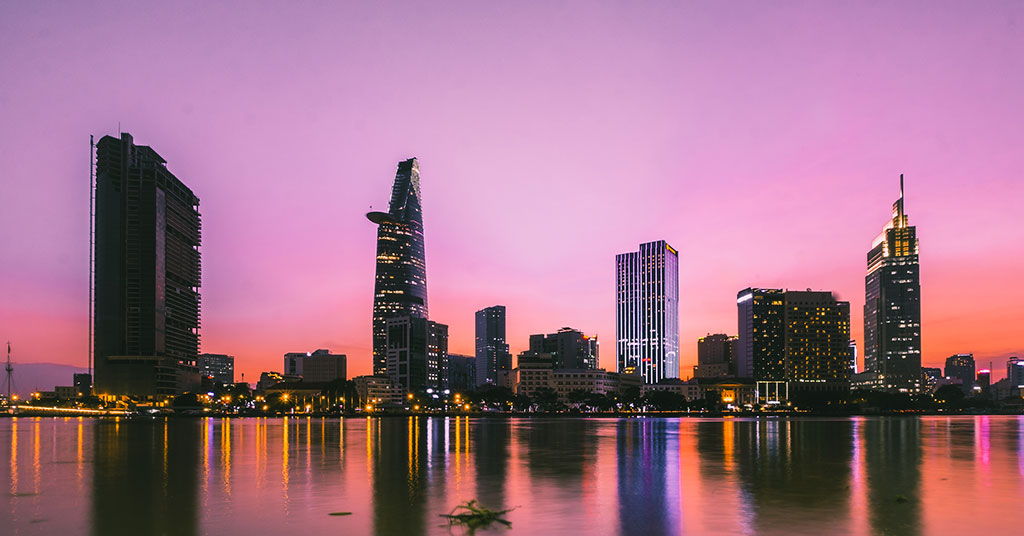Franchising in Vietnam, One of Asia's Fastest-Growing Markets

My first visit to Vietnam was in November 2008 when international franchises were just starting to appear in the country, and the GDP per capita on a purchase power parity basis (PPP) was US$4,200. Having lived in China, Hong Kong, and Indonesia, I wondered what type of economy Vietnam would have. Would investors know what franchising is? Were there companies that could qualify for U.S. franchise licenses?
Before answering these questions, let's take an in-depth look at the Vietnamese economy to see what the real potential of the market is. Today, 11 years later, the GDP (PPP) per capita is US$6,900 and international franchises are becoming well established.
Of the country's 96 million people, 12 million (1 in 8) were classified as "urban middle-class consumers" in 2017, a number expected to nearly triple to 33 million by 2020. This part of the population has a very high desire for Western brands. In my trips to Vietnam over subsequent years, everyone I met is an entrepreneur and wants to be part of the middle or upper class consumer base. The young consumer is seeking Western brands where they know they will get value, quality, convenience, and customer service. The World Bank says that Vietnam has transformed from being one of the poorest nations in the world 30 years ago to a country that is one of the hottest growth markets in Asia - and according to some, resembles the growth trajectory of its bigger brother in years past, China.
According to a recent Standard Chartered survey, Vietnam's economy is one of only a handful expected to have a net GDP growth rate of 7 percent or higher from 2018 to 2030. Vietnam's rapidly expanding middle class is anticipated to be the fastest-growing middle class in Southeast Asia. According to PwC's "The World in 2050" report, Vietnam is forecasted to be among the Top 20 economies in the world by 2050.
Vietnam has also continued a longstanding shift away from agriculture and toward industrial output. Agriculture's share of economic output shrank from 25 percent in 2000 to roughly 15 percent in 2018. While the global recession was a significant drag on the Vietnamese economy (GDP growth dropped to 5.25 percent in 2012), the country is now in a steady growth phase again. GDP grew at a rate and 6.5 percent in 2018.
|
Vietnam Country Data |
|
|---|---|
|
Population: 96 million |
Market size: 2 |
|
Median age: 30.9 years |
Franchise-friendly: 2 |
|
GDP per capita: US$6,900 (2017) |
Investment risk: 2 |
|
2018 GDP growth (projected): 1 |
Ease of doing business: 3 |
|
Exchange rate: 23,136 Dong per US$1 |
Corruption index: 3 |
Franchising in Vietnam
Franchising is no longer a new business concept in Vietnam. Major U.S. brands are now appearing in considerable numbers, and Vietnam has developed a few of its own franchise brands. Vietnam is in the process of easing its franchise laws and regulations to encourage more franchise business growth. More franchises means more trained and well-paying jobs, a focus of Vietnam's government.
Most franchised businesses in Vietnam are in the food and beverage sector with the major international burger, chicken, and pizza brands present. Vietnam also is another Asian growth market for the coffee sector. The Coffee Bean & Tea Leaf is well established, and PJ's Coffee of New Orleans has opened in Ho Chi Minh City (Saigon). Education franchises are highly valued, in both the management training and children's education sectors.
Franchise brands such as KFC, Pizza Hut, Lotteria, Jollibee, McDonald;s, Burger King, Domino's, Starbucks, Dairy Queen, The Pizza Company, Baskin-Robbins, 7-Eleven, Circle K, GS25, and many more brands from Japan, Taiwan, Korea, Singapore, Malaysia, and other countries can be found in Vietnam's two main metropolises, Ho Chi Minh City (commercial capital) and Hanoi (country capital). The biggest franchises continue to be dominated by QSR brands such as KFC, Lotteria, Jollibee, Domino's, McDonald's, and many local and foreign brands in this sector.
Foreign casual dining brands have started taking hold in Vietnam, including the popular Haidilao Hot Pot franchise from China. Other casual dining franchises from the U.S., including Outback Steakhouse, will soon be making their debut in Vietnam. Chili's has just opened its first casual dining restaurant in Vietnam. Undoubtedly there will be more foreign casual dining concepts entering Vietnam in the years ahead.
Next time: Part 2, Legal aspects and the opportunities and challenges of franchising in Vietnam
William Edwards is CEO of Edwards Global Services (EGS). From initial global market research and country prioritization to developing new international markets and providing operational support around the world, EGS offers a complete international operations and development solution for franchisors based on experience, knowledge, a team on the ground in more than 40 countries, and trademarked processes based on decades of problem-solving. Contact him at [email protected] or +1-949-224-3896. He was assisted in this article by Sean T. Ngo, CEO and Co-Founder of VF Franchise Consulting in Ho Minh City, Vietnam.
Share this Feature
Recommended Reading:
| ADVERTISE | SPONSORED CONTENT |
FRANCHISE TOPICS
- Multi-Unit Franchising
- Get Started in Franchising
- Franchise Growth
- Franchise Operations
- Open New Units
- Franchise Leadership
- Franchise Marketing
- Technology
- Franchise Law
- Franchise Awards
- Franchise Rankings
- Franchise Trends
- Franchise Development
- Featured Franchise Stories
| ADVERTISE | SPONSORED CONTENT |






 The franchise opportunities listed above are not related to or endorsed by Franchising.com or Franchise Update Media Group. We are not engaged in, supporting, or endorsing any specific franchise, business opportunity, company or individual. No statement in this site is to be construed as a recommendation. We encourage prospective franchise buyers to perform extensive due diligence when considering a franchise opportunity.
The franchise opportunities listed above are not related to or endorsed by Franchising.com or Franchise Update Media Group. We are not engaged in, supporting, or endorsing any specific franchise, business opportunity, company or individual. No statement in this site is to be construed as a recommendation. We encourage prospective franchise buyers to perform extensive due diligence when considering a franchise opportunity.